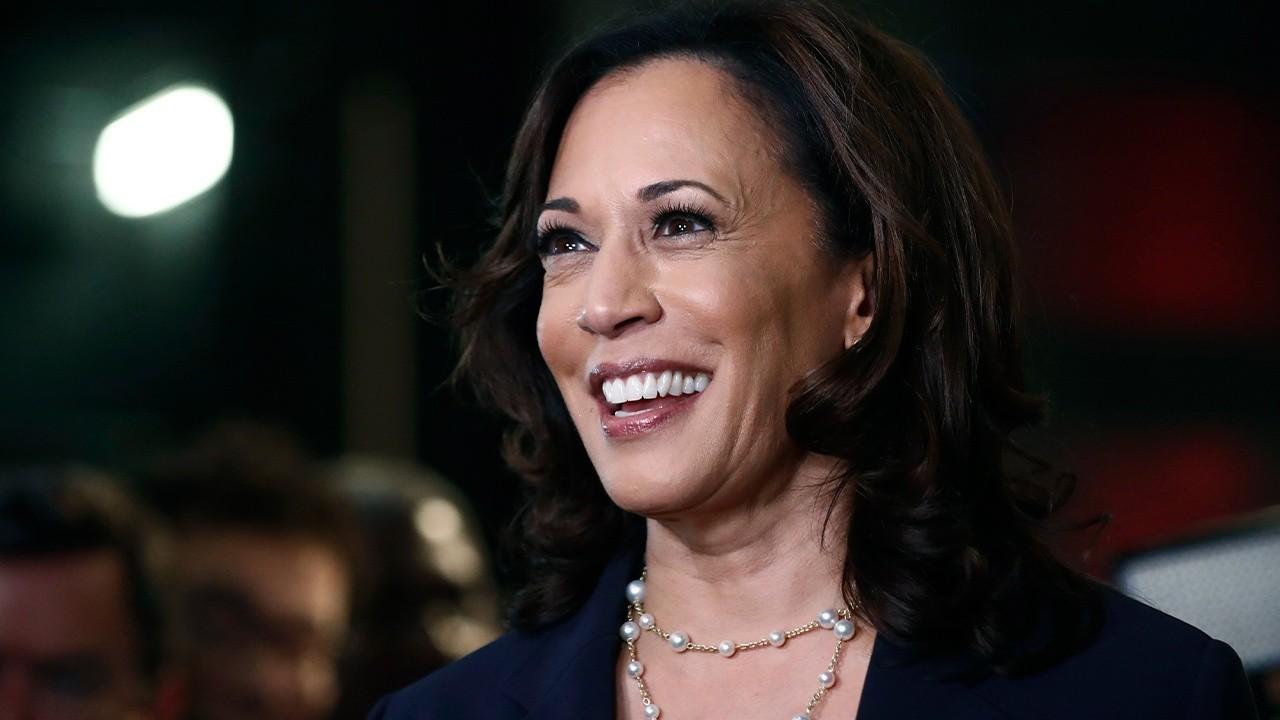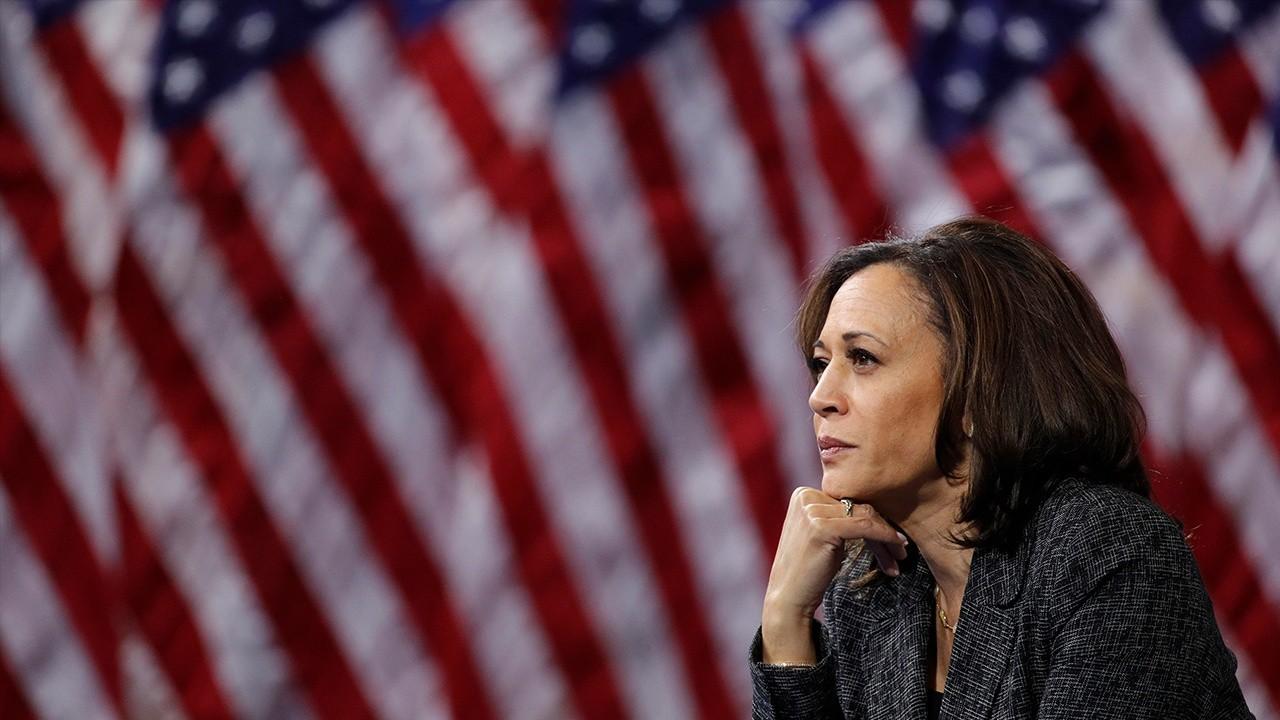Sen. Harris' financial legislation ranges from Wall Street accountability to PPP
Joe Biden's new running mate brings many money matters to the ticket
Former Vice President and presumptive Democratic nominee Joe Biden selected Sen. Kamala Harris, D-Calif., as his 2020 running mate late Tuesday and the junior senator of the Golden State has an extensive history in pursuing legislation relating to finance and the economy.
While many of her bills remain in the early stages of the legislative process and have not been enacted, she has tackled everything from holding Wall Street executives' feet to the fire to ensuring the financial system is prepared for climate change.
Here are some highlights of what Sen. Harris has proposed or supports and where that legislation currently stands:
BIDEN TAPS KAMALA HARRIS AS RUNNING MATE: WHERE SHE STANDS ON ECONOMIC ISSUES
S. 4455 -- Requirements for the Paycheck Protection Program
S. 4455 was introduced on August 5, 2020 and would require the Small Business Administration to report on the Paycheck Protection Program as well as other purposes.
The bill has been referred to the House Committee on Small Business and Entrepreneurship.
COVID-19 Racial and Ethnic Disparities Task Force Act of 2020
The COVID-19 Racial and Ethnic Disparities Task Force Act of 2020, introduced on May 13, 2020, would establish a group compromised of members of the administration, public health officials, and community-based organizations to gather data about disproportionately affected communities and provide recommendations to combat the racial and ethnic disparities in the COVID-19 response.
The task force would provide the latest data on coronavirus cases, hospitalizations, patients on ventilation, mortality, and vaccination rates by race and ethnicity. It would also identify communities that lack important resources and funding to help fight the pandemic.
The bill has been referred to the Committee on Health, Education, Labor, and Pensions.
Pandemic Disaster Assistance Act of 2020
The Pandemic Disaster Assistance Act of 2020, introduced on March 19, 2020, would amend the Robert T. Stafford Disaster Relief and Emergency Assistance Act to provide assistance to individuals affected by a pandemic regardless of whether the individual is entitled to any other unemployment compensation.
The minimum weekly benefit would be 1.5 times the national average state unemployment compensation weekly benefit for the previous year.
The bill has been referred to the House Committee on Homeland Security and Governmental Affairs.
TRUMP VS. BIDEN: STOCK MARKET WILL PICK THE WINNER
Climate Change Financial Risk Act
The Climate Change Financial Risk Act, introduced in November 2019, would direct the Federal Reserve to conduct stress tests on large financial institutions to measure their resilience to climate-related financial risks and establish an advisory group of climate scientists and climate economists to help develop climate change scenarios for the financial stress tests.
The stress test scenarios include a 1.5 degree Celsius warming scenario, a 2 degree scenario, and a “business as usual” scenario, which assumes a higher level of warming based on current climate policies.
The Fed would conduct the tests every two years on large financial institutions with more than $250 billion in total consolidated assets, and require each inistution to create and update a plan describing how it would "evolve its capital planning practices to limit the financial impacts of future climate risks."
The bill has been referred to the House Subcommittee on Environment and Climate Change.
Accountability for Wall Street Executives Act
The Accountability for Wall Street Executives Act, introduced in July 2019, would give state attorneys general visitorial authority to conduct oversight of federally chartered national banks, allowing them to issue subpoenas to inspect bank records and interview bank executives and suspected violations of real estate lending laws requiring specific information related to loans services, and products offered by banks.
In addition, it would alter language in the National Bank Act which the Supreme Court previously interpreted as limiting the "visitorial powers" of state law enforcers when addressing compliance with state law by national banks and ensure there would always be at least two "cops on the block" to ensure federally-chartered banks are complying with state financial protection laws and avoiding risks that would contribute to another financial crisis similar to the Great Recession.
The bill has been referred to the House Committee on Financial Services
WHAT IS KAMALA HARRIS’ NET WORTH?
American Dream Employment Act
The American Dream Employment Act, introduced in April 2019, would allow DACA recipients to work in jobs on Capitol Hill for members of Congress.
The bill has referred to the House Committee on Appropriations
BIDEN'S TAX RETURNS: THE 3 BIGGEST TAKEAWAYS
Rent Relief Act
The Rent Relief Act, which was first introduced in 2018 and reintroduced in April 2019, would create a new, refundable tax credit for households whose housing costs exceed 30% of their income, including rent and utilities. Unlike existing tax credits, Americans who qualify would receive the benefits every month.
The amount of the credit ranges from 25% to 100% of the excess rent, depending on the gross income of the taxpayer. The credit is not available for taxpayers with gross income that exceeds $100,000 and $125,000 for a taxpayer whose principal residence is located in a high-cost area.
For individuals who reside in government-subsidized housing, the bill allows a credit equal to 1/12 of the rent paid by the taxpayer (and not subsidized under the program) during the year with respect to the residence.
It also requires the Department of the Treasury to establish a program for making advance payments of the credit on a monthly basis.
The Columbia Center on Poverty and Social Policy estimates the Rent Relief Act would reduce the poverty rate by as much as 2.4%, lifting 7.8 million Americans out of poverty, including more than 2 million children
GET FOX BUSINESS ON THE GO BY CLICKING HERE
LIFT (Livable Incomes for Families Today) the Middle Class Act
The LIFT the Middle-Class Act introduced in January of 2019 seeks to establish a refundable middle-class tax credit of up to $3,000 for individuals and up to $6,000 for married individuals filing joint returns. Taxpayers must be at least 18 years of age to receive the credit and may elect to receive payments of the credit in advance on a monthly basis.
The bill limits the amount of the credit and eligibility for the credit based on annual income and filing status. Both the income limitations and the amount of credit must be adjusted for inflation after 2019.
The bill also requires the Internal Revenue Service to establish a "Community Volunteer Income Tax Assistance Matching Grant Program" to provide matching funds for the development, expansion, or continuation of tax preparation programs to assist low-income taxpayers and members of underserved populations
The costs of the bill would be offset by repealing the Tax Cuts and Jobs Act with the exception of provisions that provide relief to taxpayers with under $100,000 in annual income and through a fee on financial institutions with total consolidated assets of more than $50 billion.
The bill has been referred to the House Committee on Finance.





















